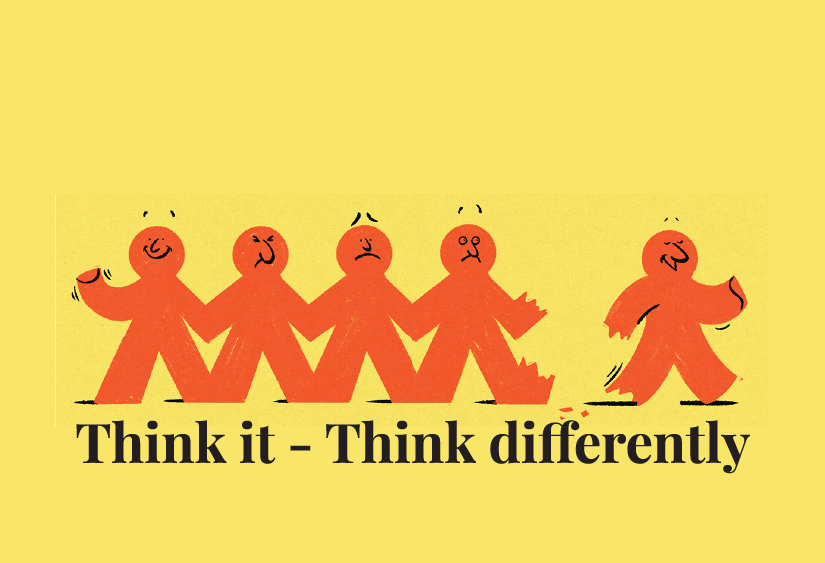
Article by
In my last post, I mentioned a phrase: “When everybody thinks alike, nobody thinks any more.” What does that mean? It may be a coincidence that few more people come to the same conclusion as you. Or it may be that nobody cares to think through and copy the ideas of other people with some variation and come to the same favourable or adverse position as everyone else and then blame the environment, outside forces for their misfortune or boost of their intellect for their success if any. But copycat people seldom achieve above normal success.
The big question is how to think differently. There are hurdles to this. For example in a group brainstorming session one might be intimidated by some outspoken members or in a situation of extrovert vs. introvert or in some cases because of peer pressure - do as the Romans do. Going different from the herd needs some conviction and courage. When someone is convinced of his/her thoughts/solutions in absolute terms then he/she may find courage to tell a different story. That needs a holistic thinking mindset of the situation/problem. Henry Ford once said, “Nothing is particularly hard if you divide it into smaller parts.”
In this way one can analyse each part independently as well as connected to other parts and can model the behaviour of the problem to see it's working by changing the interconnected parts one at a time and can be confident of his/her solution. This is known as “What-if” analysis. By asking “What if?” questions, different perspectives can be explored. It helps break out of conventional thinking and consider new possibilities. For example, “What if we approached this problem from a completely different angle?” or “What if we combined these two unrelated ideas?”
So it is not that difficult to have a different point of view. All it needs is a little extra work. You need to reflect on what you have seen or read or listened to. Reflective thinking gives you perspective and confidence in your decision-making skills. If you’re not reflecting, it’s holding you back more than you think. As Socrates said, “An unexamined life is not worth living.” Reflecting is critical thinking. Critical thinking is the ability to analyse information objectively and make a reasoned judgement. It involves evaluating sources, such as data, facts, observable phenomena, and research findings, to form a well-supported conclusion. For example asking such questions: is it true? Is there something else to it? What have others said about it? Who is right and why? What is the source? etc.
Some people are shy of speaking in a group discussion not because they are introvert but because of their natural tendency. It is a big misconception that introverted people are shy. They just prefer smaller, more intimate settings. Shyness of speaking in a group can be overcome by little things to do in advance viz. (1) Familiarise yourself with the discussion topic beforehand. This will help you feel more confident about contributing. (2) Rehearse what you want to say. You can even write down key points or questions you want to ask. (3) Practise speaking in smaller, less intimidating groups before moving on to larger ones. (4) Pay attention to what others are saying. This will help you feel more connected and make it easier to contribute. (5) If you’re unsure about speaking up, start by asking questions. This can help you ease into the conversation. (6) Understand that it’s okay to feel nervous and that improvement takes time. (7) Acknowledge your progress, no matter how small.
A very interesting read about thinking differently is “Six Thinking Hats by Edward D Bono”. "Six Thinking Hats" is a way of investigating an issue from a variety of perspectives, but in a clear, conflict-free way. It can be used by individuals or groups to move outside habitual ways of thinking, try out different approaches, and then think constructively about how to move forward. Following is a summary of Six Thinking Hats.
|
Hat |
Overview |
Technique |
|
BLUE |
"The Big Picture" & Managing |
CAF (Consider All Factors); FIP (First Important Priorities) |
|
WHITE |
"Facts & Information" |
Information |
|
RED |
"Feelings & Emotions" |
Emotions and Ego |
|
BLACK |
"Negative" |
PMI (Plus, Minus, Interesting); Evaluation |
|
YELLOW |
"Positive" |
PMI (Plus, Minus, Interesting); Evaluation |
|
GREEN |
"New Ideas" |
Concept Challenge; Yes, No, |
Po is Lateral Thinking - It is an extraction from words such as hypothesis, suppose, possible and poetry, all of which indicate forward movement and contain the syllable "po." Po can be taken to refer to any of the following: provoking operation, provocative operation or provocation operation.
Practice, Practice, Practice
 Monthly "Azeem English Magazine", launched in 2000, records the information about diverse fields like mental health, literature, research, science, and art. The magazine's objective is to impart social, cultural, and literary values to society.
Monthly "Azeem English Magazine", launched in 2000, records the information about diverse fields like mental health, literature, research, science, and art. The magazine's objective is to impart social, cultural, and literary values to society.
+92 51 88 93 092
First Floor, RAS Arcade, Eidhi Market, Street#124, G-13/4, Islamabad, Pakistan, 44000.